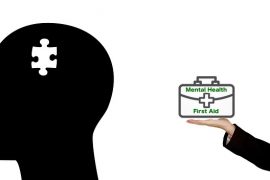Many students do not recognize the difference between being stressed and having a Mental Illness. Know the difference through this article and take the necessary interventions.

The atmosphere felt very heavy between them. Amna was repeating the question for the third time waiting for her friend Nouf’s reply. “What’s wrong with you? Why have you been acting weird for the past couple of months?”
“I do not know,” finally answered Nouf, who was still avoiding her friend’s eye contact.
“Everyone is noticing the changes in you. You even started skipping classes for no reason. You no longer hang with us, and it looks like you are not interested in anything anymore,” stated Amna with her face lined with worry.
“I might be just very stressed because of the school load,” answered Nouf in a low tone.
“We are all stressed! But you are not your usual self. It feels like you are a different person. Tell me what’s wrong so I can help.”
Nouf finally raised her head up, looked at her friend and said in a voice half choked with grief, “I don’t know what’s wrong with me. I feel ashamed of myself, and I feel that everything in my life is collapsing slowly.”
Without realizing it Nouf’s tears ran down her cheeks.
University students experience a lot of pressure and many challenges during the four years of school. They need to adjust to a new educational system, choose a field of study that can define the rest of their lives, manage class pressure, fit in with the overall environment, and pay bills. Although all students are exposed to the same set of experiences, each one of them reacts and handles situations differently. Some might feel excited and motivated by the challenges and others might feel pressured. In all cases, students encounter different levels of stress.
Stress is the body’s way of reacting to difficult situations. During periods of stress, the nervous system releases hormones such as adrenaline and cortisol to prepare the body for any threat. When students get stressed frequently their body’s stress emergency system gets activated too often, which makes it harder to shut down and this results in being stressed continuously. “A poll conducted by mtvU and the Associated Press in the spring of 2009 reported that 85% of students say they experience stress on a daily basis.” (Stressed or Depressed? Know the Difference, 2015)
Being stressed continuously tires the body and weakens the immune system. Students enduring continual stress can experience memory problems, constant worrying, loneliness, sadness and eating disorders. Two university students in Dubai were interviewed and asked about the feelings and thoughts that they experienced during stressful times. During exams, AJ felt extreme sadness and had many interrupted sleeping nights due to stress that visited her in the form of nightmares. EM who experienced negative thoughts repeatedly stated that “The amount of stress that I had during my thesis made me regret studying in the first place.” Stress can be inevitable in many situations and especially for students during exams and deadlines.
Exposure to constant stress can develop into chronic stress, which leads to Mental disorders such as anxiety and depression. Therefore, learning how to manage stressful situations and how to lower levels of stress is vital for students’ mental and physical health. Some of the techniques that can help in reducing stress include regular exercising, maintaining a healthy diet, sleeping well, meditating, and having a support system such as family and friends (Segal, Smith, Segal, & Robinson, 2018).
Sometimes students confuse being stressed with being mentally ill, due to the similar symptoms such as the feelings of extreme sadness and anxiety. It is important to distinguish between the two concepts so that the right measurements and treatment plans are followed accordingly. On the one hand, stress occurs when there is a pressuring situation or a stressor. Furthermore, once the cause of stress ends the feelings of sadness, anxiety, and worrying would end with it.
On the other hand, mental illness/disorder is a health condition that causes changes in an individuals’ thinking, emotions, or behavior (or all of three). It causes distress to an individual and problems functioning in social and professional settings. Mental health illness can be caused by genetic factors, harsh environment (extreme stressful events), and biochemical changes in the brain or a combination of these factors. There are many types of mental illnesses including depression, bipolar, schizophrenia, and anxiety disorders (Recognizing Warning Signs and How to Cope, 2015).
According to the National Alliance on Mental Illness, 75% of all mental health conditions begin before the age of 24. This indicates that university students could develop a mental health illness during their university years. Statistically speaking, one in four university students lives with a mental health condition. If students did not recognize their mental health illness and confused it with university stress, this could lead to worsening their conditions to the point of suicide (NAMI, 2018).
Each mental health illness has its own specific set of symptoms but generally speaking, some symptoms include, social withdrawal from family and friends such as dropping from school; having problems with concentration to the extent that an exam paper would appear blank; excessive anxiety, worries, and fears that would stop a person from performing daily activities; extreme eating and sleeping behaviors such lack of sleep or over eating; hallucination or supernatural thoughts can hunt some individuals; unnecessary feelings could form such as anger towards self or others, guilt, and nervousness; lack of energy and motivation. Some or all of these symptoms can occur, and they can continue for months or even years. If interventions are not taken in the initial phases this can result in self-harm and suicide attempts.
Society’s stereotypes and misconceptions about mental illness prevent many individuals from seeking treatment or even disclosing their mental illness. Some of these misconceptions include the belief that there is a lack of treatment plans for diagnosed individuals, and that diagnosed individuals are dysfunctional and cannot be a part of the community. However, like any other illness, mental illness does have effective treatment plans such as medications and therapy sessions, which are specified for each individual illness. Also, there are examples of individuals who have mental illnesses and are functioning well in the society and achieving many wonderful accomplishments. Some of these famous individuals who were diagnosed with a mental illness yet recorded many great achievements include Jim Carrey, Leonardo DiCaprio, Ben Stiller, Isaac Newton, Buzz Aldrin, and Beethoven.
P.S. If you’re facing any sort of mental health issue problems, please refer to this post for suggestions on how to get help.
References:
Mental Illness and the Family: Recognizing Warning Signs and How to Cope. (2016, December 08). Retrieved February 09, 2018, from http://www.mentalhealthamerica.net/recognizing-warning-signs
NAMI. (2018). Retrieved February 09, 2018, from https://www.nami.org/Learn-More/Fact-Sheet-Library
Pedrelli, P., Nyer, M., Yeung, A., Zulauf, C., & Wilens, T. (2015, October). College Students: Mental Health Problems and Treatment Considerations. Retrieved February 09, 2018, from https://www.ncbi.nlm.nih.gov/pmc/articles/PMC4527955/
Top 5 Mental Health Challenges Facing College Students. (2018, January 10). Retrieved February 09, 2018, from http://www.bestcolleges.com/resources/top-5-mental-health-problems-facing-college-students/
Schneiderman, N., Ironson, G., & Siegel, S. D. (2005). STRESS AND HEALTH: Psychological, Behavioral, and Biological Determinants. Retrieved February 09, 2018, from https://www.ncbi.nlm.nih.gov/pmc/articles/PMC2568977/
Segal, J., Smith, M., Segal, R., & Robinson, L. (2018, January). Stress Symptoms, Signs, and Causes. Retrieved February 09, 2018, from https://www.helpguide.org/articles/stress/stress-symptoms-signs-and-causes.htm
Stressed or Depressed? Know the Difference. (2015, October 08). Retrieved February 09, 2018, from http://www.mentalhealthamerica.net/stressed-or-depressed-know-difference
Warning Signs of Mental Illness. (2015). Retrieved February 09, 2018, from https://www.psychiatry.org/patients-families/warning-signs-of-mental-illness
Weir, K. (2012, February). The beginnings of mental illness. Retrieved February 09, 2018, from http://www.apa.org/monitor/2012/02/mental-illness.aspx



